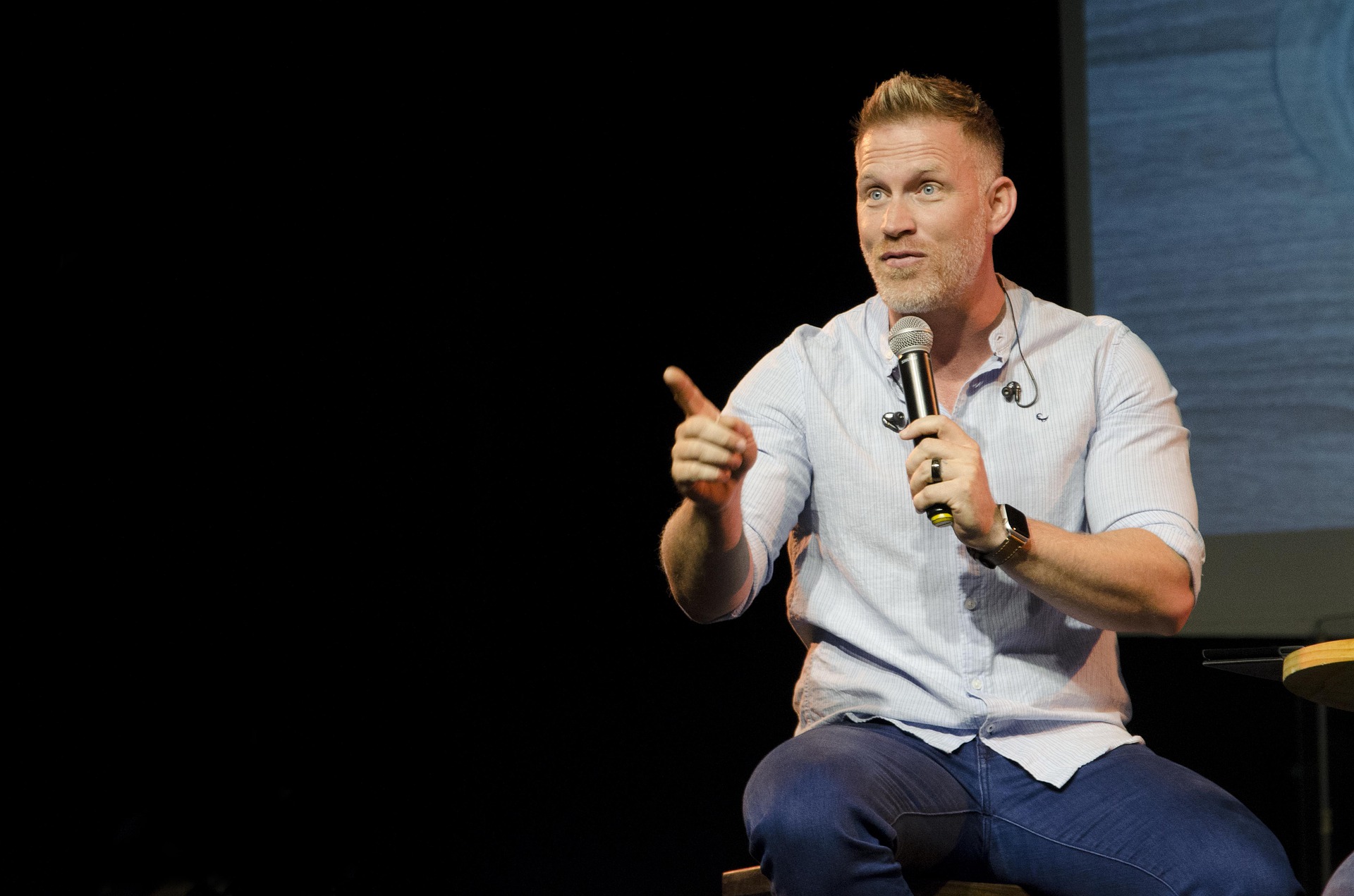
The temperature is dropping, the leaves are turning gold and it hasn’t stopped raining in a week. Summer is long over, and the next break is far from around the corner. With the days getting shorter it gets harder and harder to stay motivated, whether that’s for work, school, or other tasks that are waiting for you on your to-do list. If only there was a quick fix, a pill, magic potion, or a spell, to solve your lack of motivation in a heartbeat. Or in a twenty-minute-or-so speech…?
The temperature is dropping, the leaves are turning gold and it hasn’t stopped raining in a week. Summer is long over, and the next break is far from around the corner. With the days getting shorter it gets harder and harder to stay motivated, whether that’s for work, school, or other tasks that are waiting for you on your to-do list. If only there was a quick fix, a pill, magic potion, or a spell, to solve your lack of motivation in a heartbeat. Or in a twenty-minute-or-so speech…?

Image: Roché Oosthuizen
Motivational speakers claim to have found the magic key to instant motivation. Such a key sounds tempting, doesn’t it? No wonder motivational speaking has become such a big business. This is not just through YouTube videos, TED-talks, or podcasts on Spotify, but also through actual motivational speaking agencies. Ex-presidents, top athletes, or businessmen are all too willing to share their key to success, to motivate you or your employees. That is in exchange for a stack of money, of course. It seems fair to wonder then if all that money is really worth it? Does the magic key work or will you find yourself standing in front of that door to success, slammed shut in your face, more unmotivated than ever?
Let’s start off with the question ‘what is motivation exactly?’ According to Andrew J. Elliot (2006), motivation is the process that gives direction, energy, and persistence to human behavior. If that is motivation, how do motivational speakers make others more motivated, how do they start that process? Is there a scientific basis? Due to a lack of empirical research on the mechanisms behind and the effectiveness of motivational speaking, I turned to a highly reliable source: the motivational-speaking agency themselves. According to various motivational speaking-agencies, there definitely is a scientific basis. Most of them just state that it has been scientifically proven to motivate people without going into further details about how and by whom, but some of them do actually give an explanation. Or at least make an attempt.
“Hoffman explains that motivation is very personal and task-specific: there is no one magical solution.”
One of the agencies wrote a blog on their website in which they try to explain the mechanism behind motivation (Lupton, 2019). First, the distinction between intrinsic and extrinsic motivation is explained and the Incentive Theory of Motivation by Clark Hull is described. According to this theory, ‘Individuals are driven to complete tasks and better themselves because of external rewards’, this theory is also linked to operant conditioning. Then they go on to explain another theory by Clark Hull: The Drive-Reduction Theory, which focuses on the individual’s intrinsic nature and is based on the idea of homeostasis and the desire to find internal balance. This is where the motivational speakers come in: motivational speakers, according to this blogpost, ‘elicit that internal reward through their inspirational stories’. But, if the motivational speaker elicits the same reaction in your brain as the completion of a task, doesn’t that make actually doing the task redundant? Besides the vagueness of this explanation, it also does not answer the question of how, and maybe more importantly if, the motivational speech will actually do the motivating.
In his article for Psychology Today, Bobby Hoffman, an associate professor with a Ph.D. in Educational Psychology and author of various books on motivation, describes why motivational speakers are often actually ineffective. According to him, most motivational speakers fail to realize that motivation cannot be mandated. The biggest problem with motivational speaking is often motivational speakers offer a ‘one-size-fits-all’ solution to becoming motivated, but this is not how it works (Hoffman, 2017). To illustrate the ridiculousness of such a solution, he often brings a magic wand to his seminars and declares people motivated after waving the wand over their heads. Hoffman explains that motivation is very personal and task-specific: there is no one magical solution. When someone does follow the presumably ‘magic’ prescription to getting motivated offered by the motivational speaker and it doesn’t work, that person will be even less motivated due to feelings of frustration.
“Just don’t expect miracles: you will still have to put in the work.”
So, there does not seem to be one magical key to become motivated: not everyone’s door to motivation and success is the same. But does this mean that motivational speaking is of no use? Whereas Hoffman is very pessimistic about the art of motivational speaking, Dr. Nils Jostmann, an expert in human motivation and lecturer at the University of Amsterdam, is more optimistic about its effectiveness. When I asked him about the mechanisms behind motivating others, he explained that there are two important factors to keep in mind when motivating others. The first one is to take down the barriers people might see and increase their expectancy of the likelihood of completing the task. This is to increase people’s belief in their capability of completing the task and getting the reward. The other aspect is values, whether you focus on the value of the task itself by giving meaning to the task or focus on the value of the reward. Having a good sense of what your audience needs and responding to that, makes a good motivational speaker according to Jostmann.
Besides what the audience needs, it is also important to consider what and who the audience is willing to believe. According to Jostmann people generally have a strong desire to believe motivational speeches when it is exactly what they want to hear: ‘you can do it’, ‘you are able to achieve greatness’, ‘your job matters’. However, people are also prone to reactance, to perceive a message as pushy, and actively resist the message. This could happen for various reasons, for example when the speech is aimed at an entirely different culture or when the speaker is perceived by the audience as insincere and hypocritical. A very typical American speech about believing in yourself and not giving up on your dreams doesn’t work for a European audience, and a boss who is viewed by his employees as lazy or unqualified will probably elicit a reaction along the lines of ‘sounds nice, but you probably just want to force us to work over-time’, accompanied by an eye-roll and a loud sigh. Not knowing what appeals to your audience or not being the right person to deliver the message could make a motivational speech even counter-effective.
Motivational speaking is not the one magical key to becoming more motivated, as every door to motivation and success is different. However, if the key is carefully adjusted to the door at hand, it could actually open it. So, perhaps, motivational speakers may be worth that stack of money if they have a good sense of their audience’s needs and tailor their speech accordingly. However, this theory has yet to be supported by empirical research. You could also just find yourself a motivational speaker online with whom you relate or look up to and gives you the motivation you need. Just don’t expect miracles: you will still have to put in the work.<<
References
– Hoffman, B. (2017, april 24). Three reasons why most motivational speakers are dead wrong. Psychology Today. https://www.psychologytoday.com/us/blog/motivate/201704/three-reasons-why-most-motivational-speakers-are-dead-wrong
– Lupton, M. (2019, 29 april). The Science Behind Motivational Speaking. The Motivational Speakers Agency. https://motivationalspeakersagency.co.uk/news/the-science-behind-motivational-speaking
Motivational speakers claim to have found the magic key to instant motivation. Such a key sounds tempting, doesn’t it? No wonder motivational speaking has become such a big business. This is not just through YouTube videos, TED-talks, or podcasts on Spotify, but also through actual motivational speaking agencies. Ex-presidents, top athletes, or businessmen are all too willing to share their key to success, to motivate you or your employees. That is in exchange for a stack of money, of course. It seems fair to wonder then if all that money is really worth it? Does the magic key work or will you find yourself standing in front of that door to success, slammed shut in your face, more unmotivated than ever?
Let’s start off with the question ‘what is motivation exactly?’ According to Andrew J. Elliot (2006), motivation is the process that gives direction, energy, and persistence to human behavior. If that is motivation, how do motivational speakers make others more motivated, how do they start that process? Is there a scientific basis? Due to a lack of empirical research on the mechanisms behind and the effectiveness of motivational speaking, I turned to a highly reliable source: the motivational-speaking agency themselves. According to various motivational speaking-agencies, there definitely is a scientific basis. Most of them just state that it has been scientifically proven to motivate people without going into further details about how and by whom, but some of them do actually give an explanation. Or at least make an attempt.
“Hoffman explains that motivation is very personal and task-specific: there is no one magical solution.”
One of the agencies wrote a blog on their website in which they try to explain the mechanism behind motivation (Lupton, 2019). First, the distinction between intrinsic and extrinsic motivation is explained and the Incentive Theory of Motivation by Clark Hull is described. According to this theory, ‘Individuals are driven to complete tasks and better themselves because of external rewards’, this theory is also linked to operant conditioning. Then they go on to explain another theory by Clark Hull: The Drive-Reduction Theory, which focuses on the individual’s intrinsic nature and is based on the idea of homeostasis and the desire to find internal balance. This is where the motivational speakers come in: motivational speakers, according to this blogpost, ‘elicit that internal reward through their inspirational stories’. But, if the motivational speaker elicits the same reaction in your brain as the completion of a task, doesn’t that make actually doing the task redundant? Besides the vagueness of this explanation, it also does not answer the question of how, and maybe more importantly if, the motivational speech will actually do the motivating.
In his article for Psychology Today, Bobby Hoffman, an associate professor with a Ph.D. in Educational Psychology and author of various books on motivation, describes why motivational speakers are often actually ineffective. According to him, most motivational speakers fail to realize that motivation cannot be mandated. The biggest problem with motivational speaking is often motivational speakers offer a ‘one-size-fits-all’ solution to becoming motivated, but this is not how it works (Hoffman, 2017). To illustrate the ridiculousness of such a solution, he often brings a magic wand to his seminars and declares people motivated after waving the wand over their heads. Hoffman explains that motivation is very personal and task-specific: there is no one magical solution. When someone does follow the presumably ‘magic’ prescription to getting motivated offered by the motivational speaker and it doesn’t work, that person will be even less motivated due to feelings of frustration.
“Just don’t expect miracles: you will still have to put in the work.”
So, there does not seem to be one magical key to become motivated: not everyone’s door to motivation and success is the same. But does this mean that motivational speaking is of no use? Whereas Hoffman is very pessimistic about the art of motivational speaking, Dr. Nils Jostmann, an expert in human motivation and lecturer at the University of Amsterdam, is more optimistic about its effectiveness. When I asked him about the mechanisms behind motivating others, he explained that there are two important factors to keep in mind when motivating others. The first one is to take down the barriers people might see and increase their expectancy of the likelihood of completing the task. This is to increase people’s belief in their capability of completing the task and getting the reward. The other aspect is values, whether you focus on the value of the task itself by giving meaning to the task or focus on the value of the reward. Having a good sense of what your audience needs and responding to that, makes a good motivational speaker according to Jostmann.
Besides what the audience needs, it is also important to consider what and who the audience is willing to believe. According to Jostmann people generally have a strong desire to believe motivational speeches when it is exactly what they want to hear: ‘you can do it’, ‘you are able to achieve greatness’, ‘your job matters’. However, people are also prone to reactance, to perceive a message as pushy, and actively resist the message. This could happen for various reasons, for example when the speech is aimed at an entirely different culture or when the speaker is perceived by the audience as insincere and hypocritical. A very typical American speech about believing in yourself and not giving up on your dreams doesn’t work for a European audience, and a boss who is viewed by his employees as lazy or unqualified will probably elicit a reaction along the lines of ‘sounds nice, but you probably just want to force us to work over-time’, accompanied by an eye-roll and a loud sigh. Not knowing what appeals to your audience or not being the right person to deliver the message could make a motivational speech even counter-effective.
Motivational speaking is not the one magical key to becoming more motivated, as every door to motivation and success is different. However, if the key is carefully adjusted to the door at hand, it could actually open it. So, perhaps, motivational speakers may be worth that stack of money if they have a good sense of their audience’s needs and tailor their speech accordingly. However, this theory has yet to be supported by empirical research. You could also just find yourself a motivational speaker online with whom you relate or look up to and gives you the motivation you need. Just don’t expect miracles: you will still have to put in the work.<<



